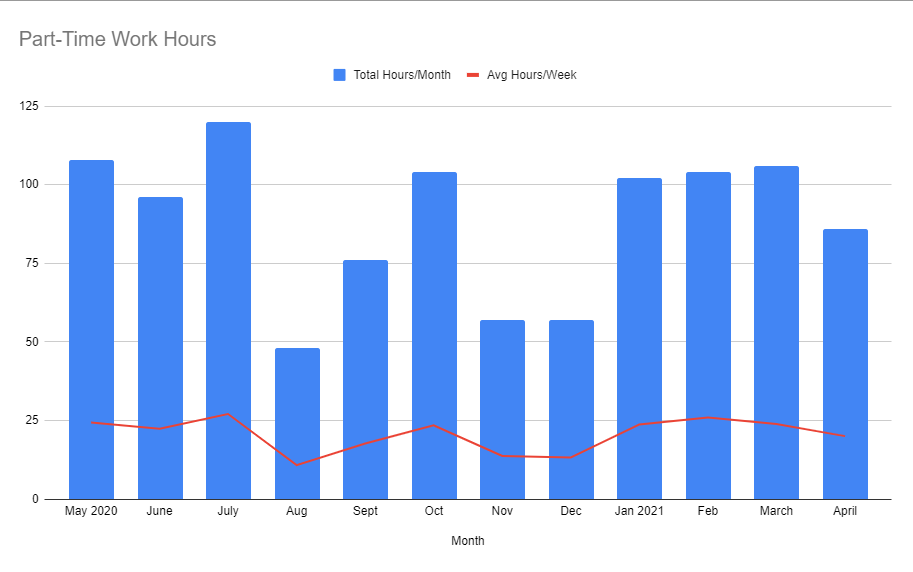One year ago, I handed over my overwhelming, high-stress, life-sucking role as a pharmacy manager to my replacement. After 5 years in the role, I thought I’d feel a sense of loss as I signed over the official paperwork signifying the transition. Instead, I was both relieved and excited for my new life in a new role.
I started in a new part-time position which was a huge step down from a full-time pharmacy manager (along with a handful of other titles). My position was also new to the company so I was able to create the job description and help set the expectations of the job.
I expected to have fewer responsibilities, to have more flexibility in my schedule, and to have reduced working hours.
Now that I’ve had one year in this part-time role, I want to reflect on my expectations versus reality. I’d like to tell you what I’ve learned in my first year as a part-time employee and the effect it’s had on my FIRE life.
Learning From the Experience
The part-time position I started a year ago consisted of two parts: being a relief pharmacist and managing the compounding department. My job is to fill in for the full-time pharmacists when the other two relief pharmacists are not available, maintain the compounding lab, and prepare for accreditation visits.
The role of a relief pharmacist at my company is loosely defined and unclear. The relief position has an unknown number of hours by the nature of the position. Because of this, what I expected from this role did not quite match the company’s expectations.
What I learned by having fewer responsibilities
One of the things I was looking forward to most was not being the pharmacy manager. I was no longer the person in charge of every little thing that happened at the pharmacy. The stress that came with that responsibility was passed on to someone else.
I thoroughly enjoyed coming to work knowing that I was not the one that had to deal with a technician quitting in the middle of a pandemic or having to follow up with a customer complaint. Now, these issues are handled by the new manager and I get to focus on my assigned duties.
Some days I found myself disappointed I was not involved with a project. I didn’t really want to be involved, it was just what I was used to. I reminded myself that is what chose to give up to be in the position I was in now. More responsibilities would increase my stress level and require more time to complete. If I didn’t want to fall back into my old stressful life and be able to continue to enjoy the benefits of part-time work, I would need to focus only on what gets the job done.
I learned to stick to my agreed upon duties.
However, an issue I ran into was that some of the expectations of the relief position were unclear. I was under the assumption that I would be called in when the two other part-time pharmacists were unavailable. Little did I know, I became the “go-to“ person because my skill set is so versatile. Because I was unaware of the order of operations, I felt obligated to always say yes to the requests. I put the needs of the company above my own needs and desires.
Soon my hours started to creep up exceeding the original plan. This part-time role was starting to feel more like a full-time role without the benefits package. Finally, I asked for clarification and found out that the managers just preferred me over the other part-time pharmacists. It was not my fault they weren’t as good as me. These requests were beyond what I agreed to in the job description and I felt they were taking advantage of my generosity. Once I knew there were other options, I wasn’t so generous with my time.
I learned to speak up for myself and to ask questions when something is unclear.
What I learned by having a flexible schedule
Having a flexible schedule lets Chris and I do more things together. Activities we want to do no longer have to wait until the weekend. We could go to the park on a sunny afternoon on a whim or head out of town without planning for vacation time months in advance. We often reflect on how nice it is to be able to enjoy the outdoors during the weekdays instead of being stuck inside a windowless office.

With my schedule, I now get to dictate when I will be unavailable for days or even weeks. I do not have to put in vacation requests. This was actually hard to get used to and I found myself reviewing the work schedule to find the most convenient days to be unavailable versus putting my own schedule first. It was a mindset I had to change. I needed to start living my life around my own schedule versus around my work schedule.
I learned to shift my mindset to be more focused on myself versus work-focused.
What didn’t help me make this mindset change was that my company started to use me in a more regular scheduled role versus as needed for urgent situations. I became a crutch filling a void because someone left the company. I expected this for a short period of time until a replacement was found, but not for 8 months. Again, I made this worse by continuing to agree to the requests and not putting my wants first.
On the other hand, because of the flexibility in my schedule, I was available to help with the Covid-19 vaccination service. With the pandemic, they needed all the help they could get to administer the vaccines. Giving up some of my free time to be a part of the solution was something I chose to do.
I learned to give only as much as you want to give.
What I learned by having reduced hours
My part-time role was expected to be 20 hours per week and to continue to decrease over the next year. While some weeks were heavier than others, I typically gained half a workweek’s worth of time to my personal schedule. This is time that I could use to explore what I wanted to do and spend it with whom I wanted to.
Having so much time to myself was actually hard to get used to. I’ve never been without a schedule dictated by someone else. Now I get to call the shots and develop my own routine and plan each day the way I want to.
While I have tried a few different ways to schedule all the activities I want to do in early retirement, I still haven’t found a general routine that has stuck. This leads me to feel like some days I accomplish nothing. I don’t mind being lazy now and then but I do want to make the most of my day. I set several goals that I want to achieve over the next year, so I continue to experiment with different ways to stay productive.
I learned that structured time is not always a bad thing.
Over the past 12 months, my average workweek was 20 hours. Recently my working hours have increased way beyond what I expected because I felt obligated to work more in order to meet the needs of the company. In 2021, my monthly average was over 100 hours.

I started to fall back into my old habits of a salaried worker and do whatever the company needed no matter how long it took. It started to have a negative impact on my personal time and the promise I made to have more time for those I care about.
I needed a reminder to put my needs above my company’s. I reminded my work of the responsibilities assigned to me and clearly laid out my expectations for the future. This ended up being helpful in many ways. They can evaluate their needs and hire additional help. I can stick to my agreed part-time schedule and continue to reduce my working hours. Most importantly, I can stick to my promise of having more hours in my life to share with those I love.
I learned that setting clear expectations helps not only you but those around you as well.
Priority Reset
One of the biggest lessons I learned during my first year of part-time work is that a company will always try to get the most out of you. No matter how much you think they have your best interest at heart, they will always put their needs above yours. If you don’t put yourself first, no one else will.
Take a look at your own job expectations. Do you understand your responsibilities? Ensure your job duties match your job description. If you are unsure of your assignments, ask for clarification. If you are continuously asked to go above and beyond your job description, review the expectations of your role and make your value known.
As I move forward and enter my second year of part-time work, I am resetting my priorities. I will learn from my experience and be more focused on my personal life.
I expect to have more time to love, learn, travel, and adventure. I want to live more of a full-time life rather than a part-time job. Setting these priorities will help guide me through the next year of my FIRE life.


6 replies on “Lessons Learned From 1 Year of Part-Time Work”
Like you pointed out, clear expectations help not only you but everyone else around you. It might seem too blunt or too forward at first but in the long run everyone will be happier if they know what to expect from the beginning.
Aside from the unclear expectations at first, how do you like working part-time? Do you think you will work part-time forever? (Sorry if you’ve written about that elsewhere). I don’t know what my future holds but I wouldn’t mind doing the type of work I do now if the time ratio was inverted. I liked how you put it, “full-time life, part-time job”.
Hi thanks for the comment.
I enjoy what I do when I work but I am continuing to decrease my hours.
They seem to be willing to work with my requests for less hours and have hired another person too.
I don’t want to give up being a pharmacist and so plan to maintain my license in some capacity. So it may end up being more like 16 hours a month which I guess is still part time but to the extreme.
We shall see if they hold up their side of the deal and I don’t get dragged in again.
This post actually gave me an idea. Instead of asking to get laid off or seeking Barista FIRE making a Barista salary… Why not ask the company if I can work part time? I mean the worst they’re going to say is no and it’ll be the same working hours as BarisaFIRE but still enjoying the benefits.
Got me thinking today.
It’s worth a shot! I was very fortunate the company decided they needed someone to fill a part time role and were very worried about finding someone who could do it. When I stepped up to step out of my manager role, they were surprised but also excited because they knew I was perfect for the position. It was a win win. Of course that was pre-COVID. It just goes to show you there will always be something to stand in your way so if you want to make a change do it!
I was able to negotiate a part time position out of my full time accounting job several years ago and it was the best solution as it was better paid than most part time jobs advertised, I’d already proved my trustworthiness and the income bridged an almost 10-year gap between not needing as much income to no longer needed the job. But it was a constant push either on their part to have me take on more, or on my part to do less, or inconvenient scheduling. Usually because something happened that wasn’t anyone’s fault, such as a coworker was ill or had a sick family member or quit or a new client needed service before someone could be hired. I finally sat down with my boss and defined how many hours a year and what months I was willing to do “extra” and consoled myself that even the “extra” was still less than full time. But it was hardest to watch that me taking on less extra meant my already full time coworkers had to take on more overtime (which made them resentful at times), so I did eventually quit altogether (and missed it way less than I thought). Hopefully you are able to figure it out better than I did.
It sounds like we were in very similar situations. The past year has been the push for me ‘to do more’ phase. Although there is a light at the end of the tunnel. I have negotiated how many hours I want to work and they have already hired some more help to cover the hours. But over the past 8 months I did feel like it would be my fault if I didn’t cover a shift for a coworker. And 50% of the time it was last minute changes due to an illness or schedule conflict. In my role, this was the type of work that I was expecting as a as needed pharmacist.
I do think that I work for a company that tries to respect their employees and does care about them. For the most part, they have taken good care of me and have been willing to work with my requests. It’s just a matter of getting the guts to speak up for myself to ask for what I want.